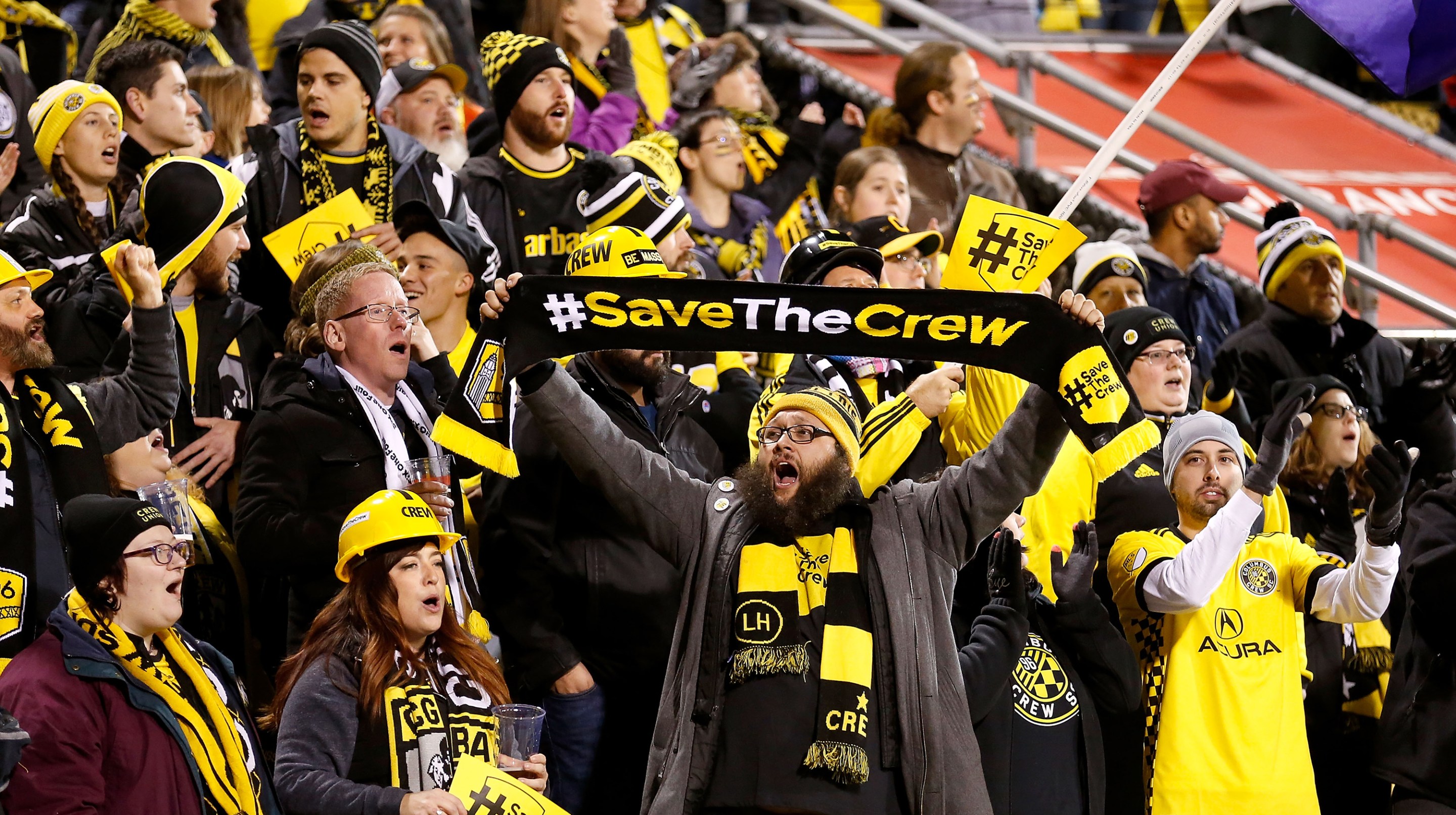The Columbus Crew's owners announced this week that the first club in MLS, one of its pillars for the last three decades, would be rebranding from its iconic name to an extremely MLS moniker: Columbus Soccer Club, or Columbus SC for short. The move adheres to the league's fixation with European soccer naming conventions and traditions, and transparently aims for some sort of global awareness and uniformity. Unsurprisingly, the move has backfired.
In Columbus, we forge paths for others to follow.
— The Crew (@ColumbusCrew) May 10, 2021
𝐖𝐞 𝐚𝐫𝐞 𝐂𝐡𝐚𝐦𝐩𝐢𝐨𝐧𝐬. 𝐖𝐞 𝐚𝐫𝐞 𝐂𝐨𝐥𝐮𝐦𝐛𝐮𝐬. 𝐖𝐞 𝐚𝐫𝐞 𝐓𝐡𝐞 𝐂𝐫𝐞𝐰.#Crew96 pic.twitter.com/oN2sOWrBS9
Some recent history: In 2017, previous owner Anthony Precourt stated his intention to move the Crew to Austin, to take over the Texas city as one of MLS' expansion/relocation franchises. That sparked the "#SaveThe Crew" campaign from local fans, who were understandably pissed that the longest-running club in the league was going to move to greener and, presumably, richer pastures. The campaign worked, as well as these things can, and Precourt sold the team to an ownership group led by Cleveland Browns owner Jimmy Haslam. Those new owners and MLS itself promised to keep the Crew in Columbus (Precourt instead got the rights to the new Austin franchise, Austin FC), with a new stadium plan in place to modernize the team's home ground. If the main goal was to keep the Crew in Columbus, then it was a win all around.
Here's where the monkey's paw began to curl, though. First, the new owners asked the city of Columbus for $50 million to build a new stadium. Given their leverage after the high-profile campaign to keep the team in Ohio, it's not particularly surprising—with the full history of American stadium deals informing the context—that the figure rose to $140 million when it came time to actually fund the stadium. Strike one.
The Crew had rebranded in 2014, changing the club's hard-hat logo to a fan-beloved circle badge that looked both elegant and unique. Similarly, the previous rebrand kept the strong black-and-gold color combination. You really can't go wrong with that contrast; just ask Borussia Dortmund. The other change was to add "Soccer Club" at the end of the Crew's name; weird, but not offensive. The new owners could have just gotten away mostly scot-free with their one-sided stadium deal, and everyone would be pleased, or even ecstatic, that the club was still around with most of its defining characteristics in place.
This latest rebrand is not that, though. The circular badge is gone, replaced by something that looks like it belongs on a movie poster for Zack Snyder's Justice League. It's supposed to be modern and industrial-looking, signaling the toughness of Columbus, or some empty brand-speak or other. The new badge and color scheme also inexplicably minimizes the gold accents that made watching games at Columbus so visually appealing; the gold wall of scarves and banners was the most striking fan experience in MLS.
And then there's the name. MLS team names go in one of two directions, generally. There are the newer teams, that copy European conventions, which are mostly jokes to anyone who pays attention: Real Salt Lake, Sporting Kansas City, and the hilariously named Club Internacional de Fútbol Miami. The other type of MLS club name is infinitely more unique to the United States, if also stupid in its own way: Seattle Sounders, Portland Timbers, Vancouver Whitecaps, etc. Columbus Crew was easily the best of these; it both sounded silly and awesome, and lended itself to memorable shorthand in "The Crew."
This idea that a club that has lasted three decades without a fundamental change to how it's presented must now transform is a problem that goes beyond Ohio. MLS is forever in search of a global audience and a bigger standing on the world club soccer stage. It's why the league markets its past-their-prime European stars so hard, and it's why every decision the league makes seems to be in service of making it more recognizable to foreign fans. Why, though? The quality of soccer in MLS is never going to be good enough to attract European fans, at least not without wholesale changes in both how the league is set up and in the amount of money coming in.
Changing team names to awkward facsimiles of European names isn't going to do it, and in the process, these owners just end up pissing off the fans that actually care about the league. Columbus supporter groups all came out vocally against this newest move, saying that they were not consulted in any way before the club's plans leaked over the weekend. This is simply another instance of a group of hyper-rich people thinking they know best, and that their consumers are sheep who will follow along with whatever decision they make. That has decidedly not been the case already:
The #Nordecke Statement on the #Crew96 Rebrand pic.twitter.com/78K0LGY4MA
— The Nordecke ⭐⭐ (@Nordecke) May 9, 2021
The move might still work for the ownership, but there's a fight already popping off. Fans in Columbus care deeply about this team, which has won two MLS Cups, and they will continue to care. There is already another #SaveTheCrew-type campaign called #KeepTheCrew, which hopes to save "Crew" as part of the club's name. (The owners, in a misguided half-measure, are trying to push that as the club's unofficial nickname; don't see that gambit working for anyone.) Whether that succeeds or not remains to be seen, but sports fans are, if nothing, loyal. It's hard to imagine a rebrand, no matter how cynical, actually driving away the fanbase, so the transformation will probably go forward so long as the owners decide they want it to. That's what happened with the Chicago Fire's rebrand a couple of years ago; everyone raised a stink but the club still keeps on ticking.
Columbus fans put their faith in a different set of rich guys than the previous rich guy, and maybe they weren't wrong to do so at the time. The alternative was to lose the club. But now the club's identity, which has been a strong part of MLS since its inception, has been changed for the worse. That's just the cost of doing business in a league that can't shake its inferiority complex, run by oblivious idiots who don't understand the value that MLS is actually providing its fans.






